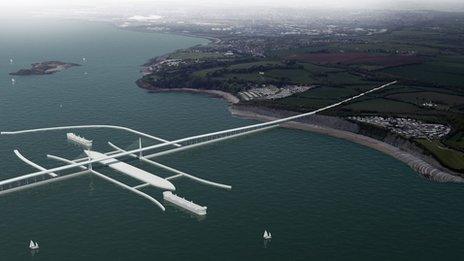Severn Barrage: Ed Davey says £30bn plan could progress
- Published

Hafren Power plans an 18km (11 mile) barrage from the Vale of Glamorgan to Somerset
A £30bn barrage across the Severn estuary could still be built, says the UK government, despite opposition from some MPs and environmental groups.
Supporters believe the barrage, from the Vale of Glamorgan to Somerset, would provide 5% of UK electricity.
Energy Secretary Ed Davey said if the right proposals were submitted the government would look at them.
But Bristol East Labour MP Kerry McCarthy said the scheme worried some people in her constituency.
In October former Deputy Prime Minister Lord Heseltine said it potentially offered "extraordinary economic regeneration".
The Conservative peer said it could be a possible long-term UK energy source.
The plan is for an 18km (11 mile) barrage between the Vale of Glamorgan and Weston-super-Mare.
A special Act of Parliament will have to be passed if the plans are to go ahead.
The firm behind the scheme, Hafren Power, is in talks with UK government ministers and environmental groups.
Speaking in the House of Commons, Bristol East MP Kerry McCarthy asked if the barrage scheme was back on the political agenda.
"I met last week with representatives of Bristol port to hear their concerns that the Severn barrage might be back on the political agenda and the possible impact of their business," she said.
Mr Davey replied: "A study was done in the early part of the coalition government and it was decided that while the government wouldn't take forward any proposals if a private consortium wants to put forward proposals we would study that.
Fish-friendly
"But at the moment we haven't seen proposals which we could back with any financial regime."
The Neath MP and former Welsh Secretary Peter Hain stood down from the Labour frontbench earlier this year to support Hafren Power's plans.
The company has said it has improved on previous plans for a barrage that were rejected in 2010 by using smaller turbines that can generate power on both the rising and falling tide and at slower speeds.
The changes, the company has said, mean its plans are more fish-friendly and will also reduce the amount of inter-tidal mudflats that will be lost to feeding birds.
It said the scheme could still generate 5% of the UK's electricity needs, or enough to power 3.4m homes.
- Published4 November 2012
- Published31 October 2012
- Published20 August 2012
- Published19 August 2012
- Published26 April 2012